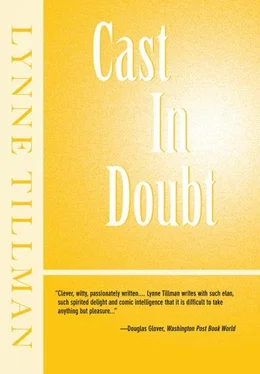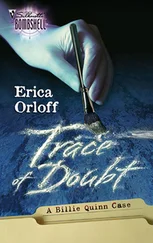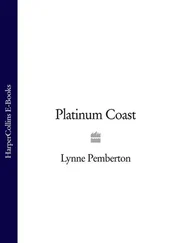When she and I walk together in town, men watch her move — women too — and I can’t tell if she’s doing something with her surprisingly round bottom or if it’s just the shape of it and her general demeanor. She’s not classically beautiful, but pretty and appealing, I think, and sexy in an awkward, almost androgynous way. She is also knowing, but then that’s an appropriately cool pose. As we get out of the car, having reached the village, which is just a few cottages, she rushes to explain that I don’t have to tell her anything I don’t want to, ever, that that ought to be our rule — no rules but that — our friendship must be different, unique. She says this so earnestly I want to embrace her, but feel that would be more common than unique and not at all hip. I respond pensively and formally, given the gravity of her statements: One should never have to say anything if one doesn’t want to do so. Helen tells me that she knows I want to be a mystery. With her, she asserts, I don’t have to try. I am one. I think quite the same thing about her, but would probably never tell her.
The sun must be directly overhead. Twelve-thirty or one in the afternoon, and still the women labor in the rocky fields — what is this always called? stubborn earth. Their tanned faces are streaked with sweat and dirt. Kostas, the peasant who fought the Turks, is sitting under the shade of his arbor, the green grapes weighing down the slight structure. I don’t know how old he is but his age has afforded him a respected position in the village, that and his having fought the hated Turks. His BMW motorcycle, a remnant of World War II and the presence of the Germans, is parked next to a small barn where several donkeys bray, annoyed by flies. It is a wonderful, pastoral scene, a scene from the past one thought evanescent. Yet it exists and is untouched, by something. Innocent, isn’t it? Is Helen affected as I am by the beauty of such simplicity?
Kostas offers us brandy— raki —in small glasses, and though it is too early for liquor and against my rules, I swallow my drink in one gulp. Helen sips hers slowly. Kostas and I converse in Greek and he pats Helen’s knee which, I can tell, doesn’t bother her. She appears to accept everything, almost neutrally. The youngest of the village children gather around us, having heard that foreigners have arrived. We are watched by dark-haired boys and girls who stand mutely by the side of the road. They stare at us guilelessly and as if we were noteworthy. Helen waves to them. Kostas eyes her and tells me, in Greek, that I am lucky to have her. I explain that we are friends, but he does not accept this and wants to know if I will marry her. It is lucky that there are many words for love in Greek, but I think he allows only one, in this case. Helen won’t have understood any of this, but I’m certain she knows we are talking about her. To change the subject I ask Kostas to show us the ruins at the top of the hill or small mountain that is the background to this scene, the backyard to his house.
He pours us another shot and disperses the children with a shake of his walking stick, perhaps a bull’s penis or some such thing. They scamper away. Helen waves good-bye, something like a queen or more likely a fairy princess, and sips a little more of her raki. I down another. To hell with rules, to hell with noon. It’s a high noon. Kostas takes her hand, which is little in his rough, big one, more like a baseball mitt — a catcher’s mitt — than a hand, and she follows him up the hill, slipping and sliding in his wake. He wears those black leather boots that reach to the knee and that, even though he’s probably worn them for decades, are stiff, very stiff. Most uncomfortable, I should think. But masculine, I suppose, in their stiffness. I’ve never thought of that before. Helen carries on up the hill, struggling but undaunted, Kostas pulling her after him. I trudge behind them silently, and the odd thing is that once we get to the top, nothing memorable occurs. I can’t, now, remember what Kostas showed us. A ruin, of course, which I’d wanted to see, and probably had already viewed, years ago, but we looked around briefly and Helen seemed uninterested, and I’m embarrassed to admit that it all escapes me. I have to admit also that I am a terrible sightseer, for when in the site I have set out to visit I usually experience disappointment, not unlike that which one has after sex. I don’t want to make too much of this.
But one sight I will always remember has nothing to do with what we ought to have seen. Perhaps the ruin was so ruined it was almost invisible. Perhaps we looked at hallowed, sacred and flat earth. Walking down the hill, Helen slipped and fell. Those stupid shoes of hers. Kostas swooped over to her, lifted her up and placed her on his back, and this ancient man carried her in that manner, on his back like a sack of potatoes, all the way down the mountain. Helen’s legs stuck out from his sides. I wouldn’t tell her so, but in the heat of the day, with her skirt riding up and her bare, tanned legs exposed, it was as if, indeed, Kostas were having her, as if they were making the beast with two backs. At the bottom of the hill, when he bent down to let her slide off his back, he kissed her cheek. It was very odd, and I don’t know what she made of it. Or what he made of it, that peculiar intimacy. She was silent all the way home but kissed me on the cheek when we returned to town, a kiss that seemed to me a bond. That’s what I thought at the time.
It’s not yet 6 P.M. The sun has already begun its descent, relinquishing its place at the top of the heavens. I watch Helen walk away, her round bottom swaying or shifting with each determined step. What is she thinking about? I have time to go to a movie, though my head feels dull and my eyes hurt from having looked continuously at the road. Those winding, horrible roads on the sides of mountains. I would leave civilization at the bottom of a hill rather than carry it on my back to the top, the way Kostas carried Helen. Helen is a kind of civilization. I must be tipsy to think that Helen is civilization, for if she is, she is of a different order from any I know. I’m certain she’s a new type, and I am somewhat proud to have discovered her while the others haven’t. This is probably why I want to know her, she who is scarcely more than a child.
I pass the cafés. The men are playing tavoli , backgammon, at the tables. A few tourists have come into town. I notice their cars first and then I see them, excited and expectant. They depress me, always. I wonder if the Gypsy woman will make further contact with Helen. I pass the theater. The movie’s a Western which I’ve already seen three times so that makes up my mind. No movie tonight. Work. I love decisions being made for me, like the wonderful blizzards that closed school and kept one at home for the day. Sadly this is not unique to me, even here on Crete, and I am not alone in remembering those wintry New England days, remembering them on hot sunny ones and reliving them, even feeling them, with a poignant pleasure.
My mother never entirely believed me when I announced I was sick; and I never believed her when she took to her bed, saying she was ill. Like all children I certainly didn’t think she’d ever leave me and die — she did, of breast cancer. Poor Mother. Father died years before her, in an airplane crash. He was with his secretary, and she perished too. I suspect she was his mistress. It was an abiding suspicion — the devoted employee is the patrician boss’s lover — but if my mother suspected as well, I never found out. She was circumspect. Father’s office, at his death, was filled with copies of Time magazine. He had subscribed to it from its beginning, from issue number one, and never threw a single copy away. Not one. He was that kind of man, economical and deliberate. He kept all the issues neatly piled and they were in mint condition at his death. Time was the only thing he collected, and in his will he left his collection to me, his younger son, his black sheep, his prodigal and wastrel. To my brother, Father willed his set of the Encyclopaedia Britannica , not that my brother was in any way bookish. Mother was to live out her days in the family house, which would one day pass on to me and my brother. According to the terms of Father’s will, after Mother died my brother and I would divide up the estate, and whatever was left would be shared jointly. In the meantime, and until her death, everything was in Mother’s name. I’m happy to say she spent her remaining days in comfort and peace. Generous to a fault, Mother scrupled to leave us as much as she could. Fortunately, I’d already received a reasonable inheritance from my paternal grandfather. I’m not certain what Time magazine meant to my father, why he collected it, or why he left all those issues to me. I got rid of them, of course. Even from his grave, Father may still have been hoping to make, as he would have said, a man of me. He may have thought Henry Luce the right kind to emulate. Indeed! I myself try to make men of boys and to have them make something of me.
Читать дальше












